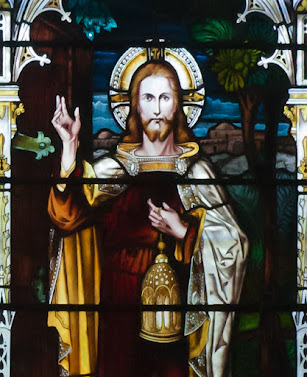Jesus spoke to them, saying, "I am the light of the world.
Whoever follows me will not walk in darkness, but will have
the light of life."
Jesus came into the world as light, but many preferred darkness (see John 3:19). There were many like those mentioned in the book of Daniel who experienced the light as a hostile intrusion, one from which they hid and which they did their best to ignore.
They suppressed their consciences;
they would not allow their eyes to look to heaven,
and did not keep in mind just judgments.
God stirred up the holy spirit of Daniel to bring light to that particular situation. But Jesus was the light of the whole world. There was nothing that "is covered up that will not be revealed, or hidden that will not be known" (see Luke 12:2). The Pharisees preferred to live in a world of appearance rather than truth.
The light of Jesus was a great comfort for those who truly sought God and trusted in his mercy, like Matthew the tax collector and the woman caught in adultery. They were not so invested in the previous lives that they perceived Jesus to be a threat. Even those of position or status who sought Jesus often did so because their need for his healing power overwhelmed any sort of prejudice against him that they possessed.
It was not possible to hide or act duplicitously in the light of Christ. But in his light, unlike any other vantage point, one could truly see. In his light one could walk and not stumble. He could see, as Jesus saw, where he came from and where he was going. A world of appearances could only produce the appearance of contentedness and peace. But in the light of Jesus one could find the consolation of knowing the purpose for his existence, the meaning of his life. One could have the peace of a higher perspective that resolved all of the shadows of the world into focus in a picture that showed how they all fit together.
Even if I do testify
on my own behalf, my testimony can be verified,
because I know where I came from and where I am going.
Jesus was uniquely qualified to give testimony about himself, since, in fact, there was no one else on earth who could. Only he saw the complete picture. The others were too much invested in appearance to give fair or impartial testimony about him. And even if they could, the limits of human wisdom only went so far. Jesus was higher than our ability to conceive, because God's thoughts are not our thoughts (see Isaiah 55:9). He was is simply too exulted to ever explain completely.
And even if I should judge, my judgement is valid,
because I am not alone, but it is I and the Father
who sent me.
Jesus was uniquely qualified to judge because his judgment was not merely his own, but also that of his Father. Together they did see the full perspective and the big picture. And no one could hide from their eyes (see Hebrews 4:13). His judgment was not only fair and impartial but there was no self-interest that could lead to any possible bias. He wasn't testifying to himself or judging the actions of the Pharisees to stoke his ego. Rather, he was light, and it was only natural that he desired to illuminate the world. Good was, as has been said, diffusive of itself.
So they said to him, "Where is your father?" Jesus answered,
"You know neither me nor my Father. If you knew me,
you would know my Father also."
No doubt the Pharisees wanted Jesus to say that God was his Father, since it was for saying this that they would later condemn him for blasphemy (see Matthew 26:63-65). But here, rather than answering directly, he more or less told them that they didn't even know what that would mean. If he had said more they would have been accountable for more. But hearing only this much they might at least have wondered how true their knowledge of the Father actually was. They might have perceived the certainty with which the voice of truth spoke, and see something of the brightness of the light. It might blind them at first, but only abiding in it was their truth and freedom.

No comments:
Post a Comment